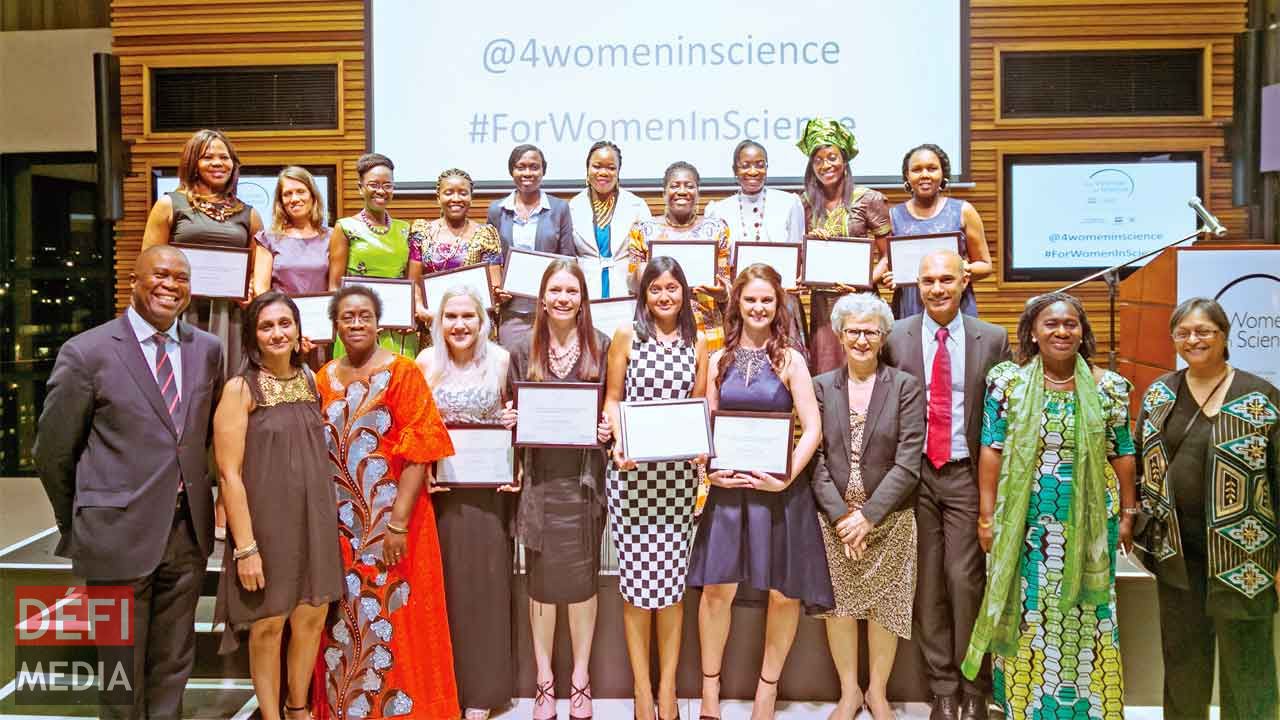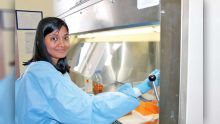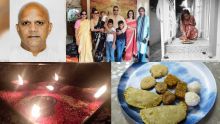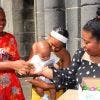
We first introduced her to our readers last October. Nafiisah Chotun was among the 14 female scientists from Sub-Saharan Africa who were awarded with the L’Oréal-UNESCO for Women in Science Sub-Saharan Africa Regional Fellowships. Honoured for her work and impact in the science field, the PhD student spared some time to tell us more about her research work, the prevalence of Hepatitis B Virus (HBV) and the importance for educating people about the issue.
Publicité
Her dedication and hard work led her to win one of the most prestigious awards in Sub-Saharan Africa and she honoured her native island. A PhD student in the Division of Medical Virology at the University of Stellenbosch, South Africa and pursuing research on the ‘Risk factors for hepatocellular carcinoma developing in patients chronically infected with Hepatitis B Virus (HBV)’, Nafiisah Chotun distinguished herself from applicants from 26 countries across Sub-Saharan Africa by winning a Doctoral Fellowship of 5,000 Euros.

But who is this brilliant and thriving young lady? Nafiisah is originally from Phoenix, Mauritius and comes from a family of two. Her younger sister Ayesha is a consultant, her father is a retired Maths teacher and her mother, a former office supervisor. Growing up, like all kids, Nafiisah had many dreams. She confides that she wanted to be everything from a forensic scientist to a doctor. “I wanted to follow a career that would allow me to help others,” she says.
Indeed, her passion for science, especially biology, since her young age, pushed her to pursue a career in the scientific field. “I have always loved reading and learning about new topics and this curiosity fuelled my desire to choose Biology as a main subject for my A-levels. I also had a fantastic teacher, Mrs Dusoruth, who really made the subject come to life for me.” Following her HSC at the Queen Elizabeth College, the young lady flew to Bangalore University, India to pursue her undergraduate studies in Microbiology. After obtaining her degree, she returned to Mauritius and worked for a year for SGS (Mauritius) Ltd.
“I decided to continue with my postgraduate studies and enrolled for an Honours programme in Medical Microbiology at the University of KwaZulu Natal, Durban, in 2010. However, since I was more interested in pursuing research in the field of virology, I applied for and accepted a position, first as an MSc student, with the Division of Medical Virology at Stellenbosch University, Cape Town in 2011 and then as a PhD student in 2013,” she explains.

Not within everyone’s ability, Nafiisah does not hide that pursuing a PhD is not a smooth sail. “Pursuing a PhD requires so much more than intelligence. You need to be resilient, mentally strong and be passionate about your research topic if you want to complete your PhD. I enjoy research work and after my Master’s degree, I wanted to continue with my work on the hepatitis B virus which is why I decided to pursue a PhD degree on the same topic.”
But what motivated her study choice in the medical sciences? “I did a one-year Honours degree in Medical Microbiology, during which I worked on Mycobacterium tuberculosis, the bacterium that causes tuberculosis,” she says. “However, I was more interested in pursuing research in the field of virology. So, now, I study viruses that are of medical interest to humans, and my area of expertise is the hepatitis B virus, which lives and multiplies in the liver and can cause liver cancer.”
Hepatitis B Virus (HBV) risks and prevalence
Nafiisah’s research work on the ‘Risk factors for hepatocellular carcinoma developing in patients chronically infected with Hepatitis B Virus (HBV)’ was recognised through the L’Oréal-UNESCO for contributing to the advancement of the field of research among others. What is the research work all about? “Hepatocellular carcinoma is a form of primary liver cancer and can be caused by long-term infection with hepatitis viruses B and C. My work is focused on hepatitis B virus (HBV for short) and some of the specific viral genetic and human genomic risk factors that may cause certain individuals with HBV to progress to liver cancer,” explains Nafiisah.

The PhD student chose this specific topic for her research work as she finds HBV to be “a fascinating virus causing a deadly disease that is under-studied in Africa”. “When my supervisor offered me the opportunity to do a PhD on HBV and HBV-related liver cancer, I did not hesitate!” she utters.
How does one get affected by the virus? “HBV is transmitted in various ways, from mother-to-child at birth, between children in early childhood, as well as sexually in adulthood and through blood contact (tattoos, sharing syringes, unscreened blood transfusions etc.). Although HBV is vaccine preventable, the first dose of the vaccine is only given at the age of six weeks, leaving a window period for mother-to-child transmission to occur.”
Nafiisah underlines that Sub-Saharan Africa is considered to be endemic for HBV. “That is, most countries have a prevalence of higher than 8%, although the prevalence varies from country to country and even between different regions of the same country. In South Africa for example, various prevalences, from 0.4% to 23% have been reported.”
What about Mauritius? “In Mauritius, there are few published reports on the prevalence of HBV, although a study published in 2011 showed that 9% of intravenous drug users had active HBV infections and a staggering 97% had been exposed to hepatitis C. However, it must be noted that unlike for hepatitis B, there is currently a cure available for hepatitis C,” highlights the PhD student.
Nafiisah trusts it is important to shed light on the disease and its risks. “Hepatitis B is a neglected disease in Sub-Saharan Africa, which unfortunately, includes Mauritius. HBV is often called a “silent killer” because people who have the long-term infection do not show any symptoms until the disease has progressed to the cancerous stage. Although they do not have any symptoms, they may still be infectious and capable of transmitting it to others. The only way to find out if one is infected is to get tested for it,” she states.

As part of her PhD project, Nafissah is educating people about HBV and by offering them a free point-of-care test which gives them their HBV status in 15 minutes. “If they are positive, I arrange for them to be seen by a gastroenterologist who decides whether they need to be on treatment on not. If they need treatment, it is unfortunately a lifelong treatment as there is currently no cure for hepatitis B. However, being treated dramatically reduces the risk of developing liver cancer.”
Remarkable achievements
Since her college days, Nafiisah has been awarded several awards, scholarships and fellowships as well as grants thanks to both her performance and her diligence. At her A-Level examinations in 2005, Nafiisah was ranked 16th on the Girls Science Side and 1st in Biology nationwide. In 2008, she was awarded first class degree and best outgoing student for her undergraduate degree in Microbiology, Zoology and Chemistry at Bangalore University, in 2010 she was awarded the Summa cum laude for Bachelor of Medical Science (Honours) in Medical Microbiology at University of KwaZulu Natal and in 2012 the Cum laude for MSc in Medical Sciences in Medical Virology at Stellenbosch University.
Since 2011, Nafiisah was awarded various scholarships among the Stellenbosch University Merit Bursary for MSc students, Poliomyelitis Research Foundation MSc Bursary (local), Stellenbosch University Merit Bursary for PhD students, Poliomyelitis Research Foundation PhD Bursary and the NRF Innovation Scholarships for non-SA citizens. In 2013, she also had the chance to be selected for a four month training fellowship at Columbia University in the City of New York as part of the Columbia University-South Africa Training Programme for Research on AIDS-related Malignancies (CUSATPRAM) funded by the National Cancer Institute and the Fogarty International Center, National Institutes of Health, USA.
The grants she won allowed her to do studies at various levels on the HBV. Among in them is the, Co-recipient of National Health Laboratory Services Research Trust (RSA) Development Grant for study titled “Whole exome sequencing of young South Africans with HBV-related hepatocellular carcinoma”, which she received last year.
However the L’Oréal-UNESCO Fellowship has been the most meaningful award of her life on different levels. “I feel privileged to have been chosen as one of the awardees of the doctoral fellowships and to have interacted with the other fellows-all incredible women pursuing amazing scientific careers! Considering that research is never a smooth sail, this victory is also a major vote of confidence in the work that I am doing!” she proudly states.
Through this award, Nafiisah aims at drawing more attention to viral hepatitis (hepatitis B and C) and viral hepatitis-related liver cancer. “I want to raise awareness on these diseases which have been neglected for far too long in Sub-Saharan Africa, including Mauritius.” She adds that she would love to collaborate on epidemiological projects with other scientists in Mauritius, in the field of infectious diseases and more specifically, viral hepatitis.
“I cannot emphasise enough that hepatitis B and C are understudied diseases in Mauritius. The figures I mentioned on the prevalence of these two viruses are a great cause of concern and reflect public health issues in Mauritius that need to be addressed. I also hope to be able to mentor and nurture young women, including young Mauritians, share my passion for science, and give them all the encouragement I can to choose science as a career path,” says the forward looking PhD student.
Regarding her projects in the pipeline, Nafiisah says that she is currently writing a few additional papers on her research work and she will also take up an internship next year, potentially in the field of public health, so as to gain some field experience to complement her laboratory expertise. Following her PhD, she plans to branch out into the field of public health. “My biggest dream is to work for a major organisation such as Médecins sans Frontières or the World Health Organisation one day and through them, help my fellow countrymen by implementing health policies to address local public health issues,” she reveals.

Notre service WhatsApp. Vous êtes témoins d`un événement d`actualité ou d`une scène insolite? Envoyez-nous vos photos ou vidéos sur le 5 259 82 00 !

















![[Info Soirée] : «Se enn moman kot tou la fami dekonekte ar portab ek rezo sosyo»](https://defimedia.info/sites/default/files/styles/square_thumbnail/public/thumbnail_200425.jpg?itok=6Z6bF_6Y)





